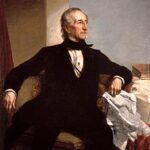The Tyler Cabinet Resignations Crisis
President John Tyler faced an unprecedented political crisis in September 1841. His entire cabinet resigned within days of each other. Only Secretary of State Daniel Webster remained in his position. This mass exodus followed Tyler’s vetoes of key Whig legislation, including the National Bank recharter. ⚠️
The Decision to Veto
Tyler vetoed the National Bank bill on August 16, 1841. The Whig Party had made this legislation their core campaign promise. Tyler believed the bank was unconstitutional despite party pressure. His second veto on September 9 triggered the Tyler cabinet resignations. Party leaders felt betrayed by their own president.
Political Isolation Begins
The Whig Party expelled Tyler after the cabinet exodus. He became known as “His Accidency” due to succeeding William Henry Harrison. Tyler had no party support for his remaining three years in office. 📊 This created an unprecedented situation in American politics. The president functioned as a political independent without Congressional backing.
Impact:
Immediate Political Consequences
The Tyler cabinet resignations created a constitutional crisis without precedent. Tyler struggled to find qualified replacements for his cabinet positions. Many politicians refused to serve under the expelled president. The Whig Party began impeachment proceedings against their former member. 🔥 Tyler’s political isolation lasted his entire presidency.
Long-term Constitutional Effects
This crisis established important precedents for presidential-party relations. Future presidents learned the importance of party loyalty and compromise. The Tyler cabinet resignations showed the limits of presidential power without party support. Congress gained leverage over executive appointments during this period. 📉 Tyler’s presidency demonstrated the weakness of politically isolated executives.
Impact on American Politics
The crisis reshaped American political party dynamics permanently. It highlighted the importance of party unity in governance. Tyler’s experience influenced how future presidents managed cabinet relations. The episode showed that presidents need Congressional support for effective leadership. 🌍 This precedent affected presidential-legislative relations for decades to come.
